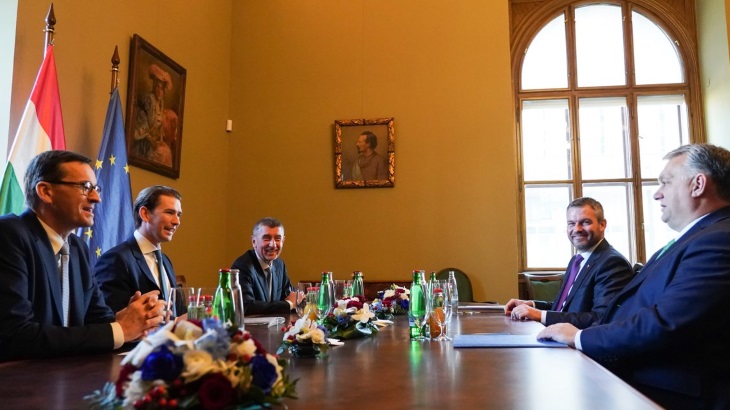Topics on their agenda included migration, border security and competitiveness, but the EU's recently announced Just Transition Mechanism (JTM) - a key financial component of the European Green Deal designed to make the bloc climate neutral by 2050 - gave context to their talks on climate policy.
EU leaders agreed in December on a bloc-wide objective of reaching climate neutrality by 2050, but Poland said it needed more EU funding to help it phase out coal. Poland did not therefore sign up to the climate neutrality objective, and so financial aid will be conditional on environmental commitments. EU leaders are to reassess the 2050 pledge at their summit in June.
The EUR100 billion JTM excludes nuclear energy in spite of its low-carbon credentials and the fact it provides more than half of the EU’s low-carbon electricity output.
Kurz told his counterparts in the V4 that nuclear energy should not be supported by the new fund. "It is very important for Austria not to support nuclear energy but the funds should be allocated for the development of renewable energy sources," he said. But Pellegrini reminded him that EU Member States are permitted to choose their own path towards carbon neutrality. "I respect Austria's efforts with respect to the use of nuclear energy," he said, “[but] Member States of the EU should have a right to their own energy mix." And Babiš had tried to win support from other EU leaders in mid-December for a declaration that nuclear power is a clean and sustainable source of power.
Funding
The European Commission's EUR7.5 billion Just Transition Fund (JTF) is reportedly set to allocate EUR2 billion to Poland and EUR877 million to Germany. Romania is to get EUR757 million and the Czech Republic EUR581 million. Italy and Spain have reportedly applied for EUR364 million and EUR307 million, respectively. France, where nuclear power is the largest source of electricity, could receive more than EUR400 million, but be barred from using it to invest in its nuclear sector. Allocation of the money, which has yet to be made public, will be based on regional transition plans, which will need to explain how the funding will be spent.
Point (a) of Article 5 of the JTM - Exclusion from the scope of support - states that the JTF shall not support the decommissioning or the construction of nuclear power stations.
Foratom, the European nuclear trade body, said it welcomed the EU's goal of providing financial support to coal-dependent regions in order to assist them in their decarbonisation efforts, but that it regrets the Commission's proposal to exclude such funds being used for nuclear power plants. "The benefits of transitioning workers from the coal into the nuclear industry have already been demonstrated in both France and the UK," Foratom Director General Yves Desbazeille said. "We therefore find it hard to justify such a proposal by the Commission."
Nuclear's contribution
Hungary's four-unit nuclear power plant in Paks generates about half of its electricity, and it is working with Russian enterprises and their international sub-contractors to add two reactors in a project known as Paks II.
Slovakia has four nuclear reactors - two each at Bohunice and Mochovce - that generate 55% of its electricity, and has two more under construction - Mochovce units 3 and 4.
The Czech Republic has six nuclear reactors - four at Dukovany and two at Temelín - generating about one-third of its electricity. The government has said it will need to build not only one new unit at Dukovany, but also more reactors at Temelín, if it is to avoid becoming dependent on electricity imports from 2030.
Poland, which relies on coal for almost half of its electricity supply, plans to build up to six reactors by 2043, and wants its first nuclear power unit to be in operation by 2033.
Austria - which is historically able to rely on hydropower for more than 60% of its electricity production, and which uses gas, coal and oil for about 25% - has no nuclear reactors. In 2015, it passed a law banning the importation of nuclear electricity, but a large part of the electricity it uses is still of nuclear origin.






_63865.jpg)
_18570.jpg)
_16159.jpg)





